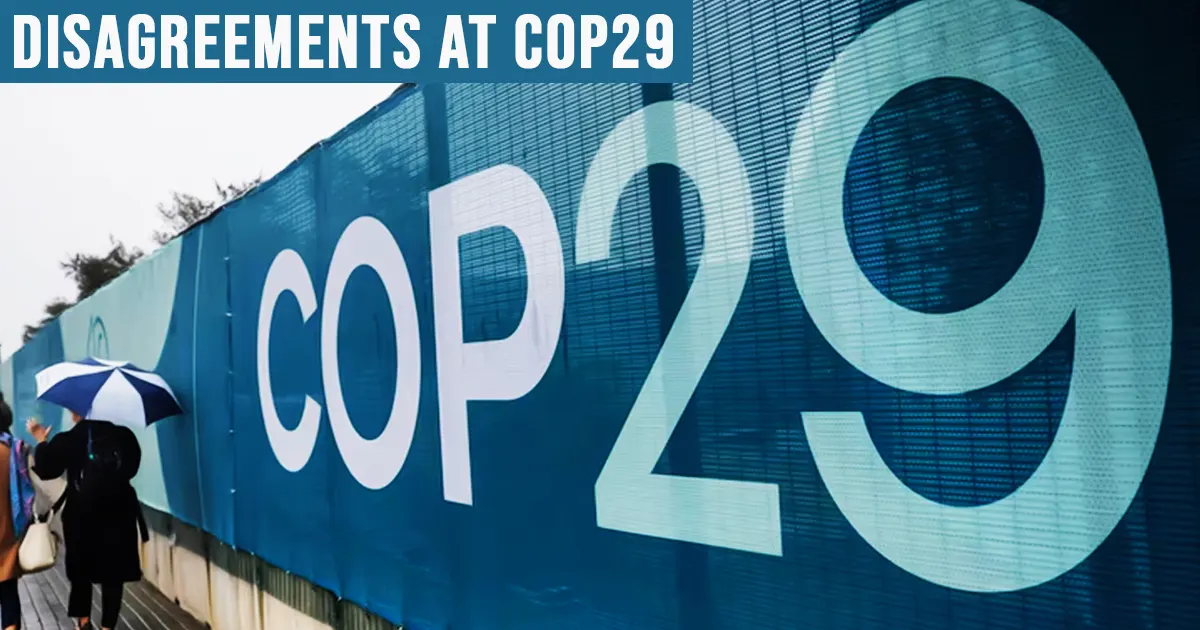
Context (IE):
COP29, held in Baku, Azerbaijan, is facing a crisis as nations and blocs have rejected the latest draft negotiating text. The primary areas of disagreement include finance and other climate-related issues, threatening the progress of the summit.
Points of Disagreement and Issues Raised
- Finance Issues:
Finance was a central focus at COP29, but developing countries raised concerns over the financial commitments outlined in the draft text. These nations argue that the draft lacks sufficient provisions for the financial support they need to implement climate actions. - Mitigation & Adaptation:
Disagreements arose over the balance between mitigation (reducing greenhouse gas emissions) and adaptation (adjusting to the impacts of climate change). Some countries argue that the draft is too focused on mitigation without addressing the urgent needs for adaptation. - Global Stock Take (GST) Disputes:
A significant source of tension was how the outcomes of last year’s Global Stock Take (GST) should influence the current negotiations. The GST is a process under the Paris Agreement that reviews climate progress and suggests course corrections. Disagreements centered on actions such as transitioning away from fossil fuels, reducing methane emissions, and phasing down coal.- India’s Opposition to Methane Cuts:
India rejected calls for reducing methane emissions, citing potential adverse impacts on agriculture, which is crucial to the country’s economy and food security. - Shifting Focus to Mitigation:
India expressed frustration with attempts to shift the focus back to mitigation, arguing that financial support for mitigation actions is just as crucial as setting ambitious goals. India emphasized the need for clear enablers to make mitigation goals achievable. - Fossil Fuel Transition Concerns:
Countries like Saudi Arabia, which are heavily dependent on fossil fuel exports, strongly opposed suggestions to phase out fossil fuels, viewing it as a threat to their economic stability.
- India’s Opposition to Methane Cuts:
- Developing Countries’ Financial Concerns:
Developing nations voiced concerns that the draft text did not provide sufficient financial support for climate actions, especially in mitigation. They stressed that without financial enablement, achieving climate goals would remain unattainable. - Equity & Differentiated Responsibilities:
Many countries advocated for the principle of common but differentiated responsibilities, where developed nations, which have historically contributed the most to emissions, should take the lead in financing climate actions.
Disadvantages of Over-emphasis on Mitigation
- Economic Impact on Developing Nations:
Focusing excessively on mitigation, particularly the phase-out of fossil fuels, may harm the development prospects of countries that depend on these resources for economic growth and employment. - Agricultural Concerns:
In nations like India, where agriculture plays a central role, transitioning away from fossil fuels and reducing methane emissions (mainly from agriculture) could undermine food security and economic stability.
Way Forward
- Focus on Finance Enablement:
The focus should shift toward strengthening financial mechanisms for raising support for both mitigation and adaptation. This would ensure that countries, especially developing ones, have the necessary resources to meet their climate goals. - Inclusive Approach:
Future agreements should include clear provisions for financial support to make climate actions feasible. This would ensure that countries can achieve both mitigation and adaptation goals, regardless of their economic status. - Balanced and Flexible Negotiations:
The negotiations should acknowledge the economic realities of fossil fuel-dependent countries. Gradual transitions and diverse pathways for achieving climate goals can provide more flexibility and equity for all nations involved. - Enhanced Global Collaboration:
Strengthening global partnerships and frameworks for financial assistance and capacity building would enable more inclusive and equitable climate action across nations, ensuring that no country is left behind.
Advantages of a Balanced Approach
- Comprehensive Action:
Addressing both mitigation and financial enablement together would allow for more effective and holistic climate action, covering both the environmental and socio-economic dimensions. - Global Cooperation:
A balanced approach that considers the economic conditions of fossil fuel-dependent countries, while still striving for ambitious climate goals, would help maintain cooperation on a global scale, promoting unity in the fight against climate change.




